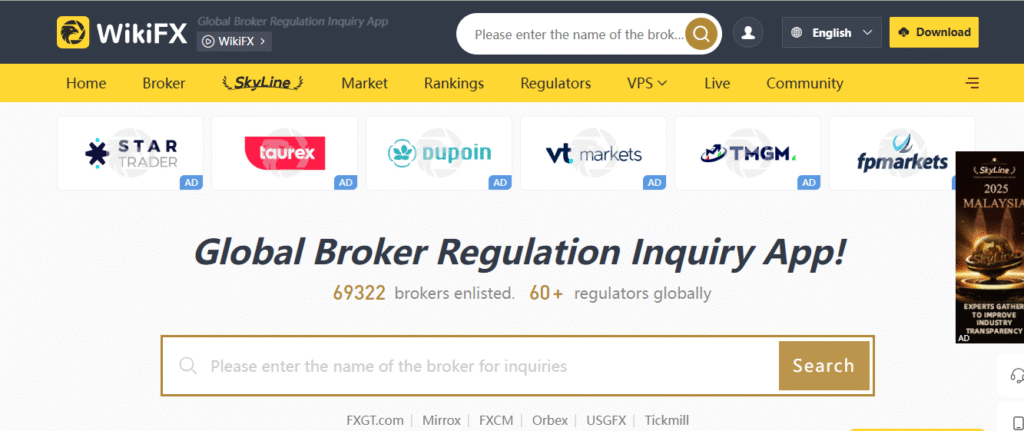Before entering the world of trading, many investors often look up broker reviews on different websites. The same applies to brokers who want to update their licenses or branding; they should get in touch with “broker review websites”.
And amid your search, you might have come across WikiFX if you have ever thought about trading seriously. They call themselves a “global forex broker regulatory inquiry app”, which sounds impressive right?
They want you to believe they are the ultimate authority for checking if a forex broker is legitimate. But here’s the truth: for a company that boasts such a grand title, they are not the same as what they define. In fact, many in the trading world suspect they are involved in something far less reputable, especially when it comes to the fake reviews they publish. Let’s dive into why their claims might be scams and how their reviews could be misleading you.

Unmasking WikiFX: Everything about them
WikiFX presents itself as a reputable “third-party service provider” that assists traders in determining whether a forex broker is reliable, legal and genuine. They claim to specialize in validating broker licenses, laws and gathering consumer feedback to provide an unbiased perspective. However, our analysis, combined with several firsthand testimonials from a famous American forum, paints a quite different picture. We discovered data indicating that WikiFX engaged in a worrisome trend of promoting fraudulent reviews and falsehoods.
Digging deeper into WikiFX’s operations shows its origins as a Chinese corporation with a dubious agenda: to defend its national platforms and eliminate competitors, particularly in Southeast Asian countries such as Thailand, Vietnam, China, the Philippines, and Indonesia. Their strategy entails designating brokers as unregulated or questionable on their site. Their supervisors allegedly engage in extortion by contacting brokers via Skype, LinkedIn, and email.
A “classic package” costs at least $3,000 a month. Forex brokers who refuse to pay are exposed to a constant bombardment of negative ratings, ultimately forcing them to comply. This manipulative strategy raises severe issues about the overall integrity of WikiFX’s review system.
WikiFX: Is Their Review System Just a Pay-to-Play Scheme?
We recently heard from an anonymous source who shared screenshots of their conversations with WikiFX managers. Here’s what happened: WikiFX published information about a broker without any prior information and linked them to negative comments.
What followed was a barrage of messages from WikiFX managers, reaching out through various social media platforms.
As the conversation continued, the WikiFX manager tried to push our anonymous contact to promote their company on the WikiFX website. When they politely declined, guess what happened next? WikiFX updated the broker’s information on their website, showing unexpectedly low ratings. So, the solution to negative reviews and a low overall rating on WikiFX is to pay up?
WikiFX’s Cheap Tactics: License Issues for Lower Ratings
Let’s look at another striking example of WikiFx’s questionable practices. We randomly picked Nomura Holdings from their listed brokers. For those unfamiliar, Nomura is a massive Japanese financial institution with nearly a century of operation under its belt— a truly established name in the industry.
Yet, when you check WikiFX, what’s the first thing you notice about Nomura? A glaring claim that they have no license. This immediately raises a red flag! A quick search on Google, however, easily confirms that Nomura Holdings is indeed fully licensed.
This deliberate deception suggests that WikiFX is intentionally deducting points from Nomura’s rating, likely in an attempt to coerce them into paying for a higher overall score. But, let’s be honest: a company with Nomura’s history and reputation will not fall for the techniques of what look to be petty scammers attempting to benefit off a well-known brand. This case reinforces the impression that WikiFX’s ratings are motivated by financial gain rather than genuine evaluation.
WikiFX Conducts Fake Investigations To Earn Money
Another example that proves WikiFX is a scam is a situation involving Finex, an Indonesian Forex Broker. WikiFX wrote an article on their visit to Finex’s office in Indonesia. They said that Finex is not authentic, and their office does not exist in real life.
However, we did called Finex officials and guess what? They told us that WikiFX visited a Greek office unrelated to Finex, photographed it, and produced a bogus review! Now, WikiFX gives Finex a bad rating and warns consumers to avoid it.
The Takeaway
Overall, WikiFX is a fraudulent review website that aims to profit from brokers by providing misleading reviews and ratings, as well as disseminating incorrect information. If brokers do not agree to WikiFX’s terms, WikiFX attempts to collect money through Internet extortion and blackmail. Please do not believe the ratings that WikiFX generates on its site. They are all forgeries purchased by people who don’t mind spending money on pointless services like WikiFX.


Don’t believe their so-called ratings. WikiFX manipulates scores for money. Honest brokers get listed as scammers, while shady ones who pay get a clean image. It’s a total fraud platform.”
They flagged an app as No License app, I believe because the app was new to the system, I later check by bit crypto exchange platform too on Wikifx, they flagged it also as No license app. This makes me think, there are nothing serious about their business.
Completely bogus platform with fake reviews and extremely poor ethics towards new brokers.
Wikifx is just looting all the new platforms, and they are even writing negative articles for the brands who are not paying for their services. No one is talking about it and they are still in the business with their poor Chinese business policies.
Several brokers claim WikiFX contacted them demanding payment to “fix” their rating. I also saw sudden score drops for no clear reason. The whole setup feels suspicious, and traders should be very careful before trusting anything on WikiFX.
They show some brokers as “high risk” without any evidence. Anyone can see that they are trying to damage certain broker reputations, probably to force them into paid partnerships. It feels manipulative and unethical.